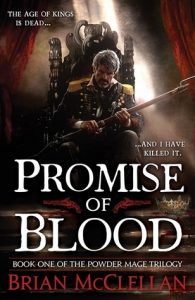Promise of Blood by Brian McClellan
 Promise of Blood captured my attention the first time I read it largely due to how different it is: this was the first time I’d read any so-called ‘flintlock fantasy’ and I thought it was great. I’m glad to say it stood up very well to a re-read, and if anything I enjoyed it even more the second time round.
Promise of Blood captured my attention the first time I read it largely due to how different it is: this was the first time I’d read any so-called ‘flintlock fantasy’ and I thought it was great. I’m glad to say it stood up very well to a re-read, and if anything I enjoyed it even more the second time round.
As I said, it’s different to a lot of fantasy on the shelves these days, particularly with regards to the setting. Instead of medieval Europe or thinly-disguised Asia, we have something more reminiscent of the turbulent social and political situation of France in the late 18th century. Rather than swords and sorcery, McClellan gives us intrigue and gunpowder; instead of kings and holy warriors, he gives us military leaders and corrupt priests; and, in refreshing turnaround of fantasy stereotypes both old and new, the characters he has created are human, likeable and believable. There are no all-powerful perfect heroes here, but neither are there any unsympathetic, grimdark anti-heroes; the author maintains a fine balance between his characters’ strengths and flaws, and for me it’s this that makes the novel so much fun to read.
Another of the novel’s strengths is how the magic system is so integral to the story. Generally speaking there are three main classes of magic in McClellan’s world, the most powerful being the Privileged sorcerers, who are able to access and wield destructive elemental forces, and whose Cabals have reinforced the monarchy for hundreds of years. Then there are the Knacked, regular people possessing relatively minor abilities such as never needing to sleep, or being able to discern truth from lies. Finally, and most interestingly, there are the fighting men known as Powder Mages, who have the ability to telekinetically control bullets, mentally ignite gunpowder from long distances, and actually imbibe gunpowder to augment their own strength. I have no doubt that the story would have been interesting even without the presence of any sort of magic system; but the magic, and the conflict created by it, is as much a part of McClellan’s world as the political and social turmoil, and adds an extra dimension to the upheaval caused by Tamas’ rise to power.
The main plot is woven through three major storylines: each focuses on a different character, and each is more or less equally captivating. Field Marshal Tamas is fighting to retain control of his country in the aftermath of his bloody coup against the monarchy; retired police inspector-turned-private investigator Adamat is charged by Tamas with uncovering the traitor in his ranks whilst also delving into long-forgotten lore in pursuit of a dark mystery that threatens the world; and Taniel Two-shot is sent on an unpleasant mission by his father which brings him into conflict with forces far greater than he can manage alone. The story more or less revolves around these three characters, but there is still plenty of room for other, more minor, characters, all of whom are delightful: my particular favourites are Tamas’ irreverent bodyguard Olem, the mysteriously powerful chef Mihali, and Taniel’s enigmatic mute sidekick Ka-poel. The only storyline I didn’t really engage with was that of Nila, the laundress, but I suspect she will become more important in future events.
Promise of Blood made the 2013 David Gemmell Morningstar Award shortlist for best debut novel, and with good reason. It didn’t win, but it had my vote!
